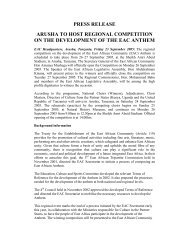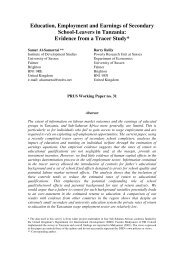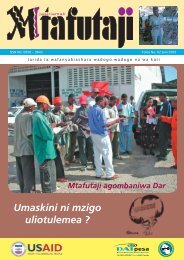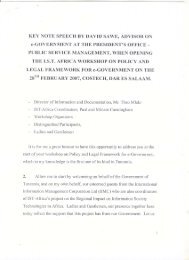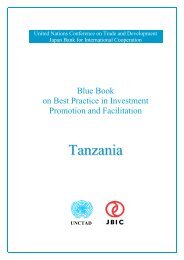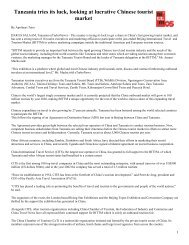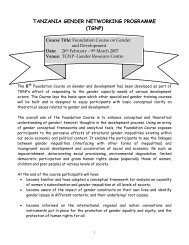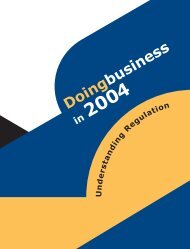September 2005 - Tanzania Development Gateway
September 2005 - Tanzania Development Gateway
September 2005 - Tanzania Development Gateway
Create successful ePaper yourself
Turn your PDF publications into a flip-book with our unique Google optimized e-Paper software.
ASPO Ireland<br />
www.peakoil.ie/newsletters<br />
593. Economic impact of high oil prices<br />
The following article explains how the stockmarkets of the West appear to be shouting their last hurrahs<br />
before the crash, while the poorer countries of the world already face the impact of high oil prices. They are<br />
high because supply capacities are being breached, meaning that prices can only move higher still unless<br />
demand can be cut. By cutting their demands, the starving poor are evidently helping prop up the<br />
stockmarket for the moment.<br />
The Peak Oil Crisis : A Mid Summer Review<br />
www.fcnp.com/521/peakoil.htm<br />
By Tom Whipple<br />
The world has never been to peak oil before so we may not immediately recognize what we are<br />
seeing. A few months back, most knowledgeable people would have said oil at $60 a barrel would have<br />
triggered an economic tsunami by now. But surprise! Here we are and it seems to be business as usual in<br />
America with company earnings doing well, the stock market setting some new highs, and thanks to great<br />
prices, SUVs and pickups are leaping off dealers' floors and onto America 's highways.<br />
So far this summer oil prices have been jumping up and down depending on which hurricane is or isn't<br />
threatening which offshore oilfield, the weekly US oil stocks report, and a little "what is happening in<br />
China?" thrown in. The International Energy Agency (keeper of the books on the world's oil supplies and<br />
who incidentally haven't had much of a track record recently) says demand — especially from China — is<br />
not what it was supposed to be this year, so we can all relax for a while and enjoy the rest of the summer.<br />
It may not be 1914 redux after all.<br />
Below the radar of even the most attentive newspaper readers, however, the first stirrings of peak oil<br />
reality are starting to trickle in. Not surprisingly, most of these reports come from the poorer parts of the<br />
world where $60 oil is simply too much for fragile economies.<br />
Here are a few of the items:<br />
• Last week the BBC reported that dozens were killed in fuel riots across Yemen when the<br />
government withdrew subsidies resulting in dramatic price increases.<br />
• All across Indonesia people were lining up at gas stations in response to developing fuel shortages.<br />
In one city, half the public transport was inoperable due to a lack of fuel.<br />
• In Zimbabwe, the government has moved to deregulate fuel procurement in the face of severe<br />
shortages: waits of hours for buses, gas lines that are blocks long, and a bread shortage. The black market<br />
price for gasoline is now ten times the official rate.<br />
• Nearly all the poorer countries make their electricity using diesel generators. Nicaragua, one of the<br />
poorest countries in Central America , recently started blacking out the poorer districts between 7 and 10<br />
p.m. , the hours of peak usage.<br />
• <strong>Tanzania</strong>, with the highest gasoline taxes in East Africa and a chaotic oil marketing system, is seeing<br />
its plans for economic growth "suffocated" by high-priced oil. <strong>Tanzania</strong> also handles fuel for the<br />
landlocked states of Malawi , Rwanda , the Eastern Congo , Burundi and Uganda .<br />
• And closer to home, Maxjet put off plans to offer cheap flights from Baltimore to London until<br />
spring when the company hopes fuel prices will be cheaper.<br />
At mid-summer, the supply-demand situation remains about the same. OPEC is supposed to be<br />
increasing its daily output by some 500K barrels a day and there is evidence from increased tanker<br />
charters that this indeed may be happening. In the meantime, production in the non-OPEC countries<br />
seems to have dropped by a collective 1.2 million barrels a day below the IEA forecasts for the first half.<br />
Thus, we have learned that $60 oil and the ensuing $2.30 gasoline is not much of deterrent to<br />
American driving habits. It is not doing much to the economy, and certainly isn’t stirring up any serious<br />
action in the Congress which continues to fuss around with a largely meaningless energy bill. With good<br />
economic growth, the US demand for oil continues to increase.<br />
The Chinese continue to claim their economy is growing nicely, suggesting increased demand for oil<br />
in the near future.<br />
OPEC and the Russians — the folks with some spare capacity left — seem to have at least squeezed<br />
out one last round of production increases in response to calls to stem growth-endangering higher prices.<br />
At the same time, many of the world's older non-OPEC oil fields are talking of dramatic drops in<br />
production.<br />
If one puts all this together, it is hard to escape the conclusion we just may be very close to Hubbert's<br />
peak right now and, some day, <strong>2005</strong> will be declared the year of peak oil.<br />
(Reference furnished by William Tamblyn)<br />
594. Country Assessment – Netherlands<br />
The Netherlands is a relatively small country of 42 000 km 2 on the northwest coast of Europe. It lies on<br />
the delta of the River Rhine and is bordered by Germany and Belgium. A large partly reclaimed inland sea,<br />
ASPO Newsletter 57, <strong>September</strong> <strong>2005</strong> page 3 of 12



